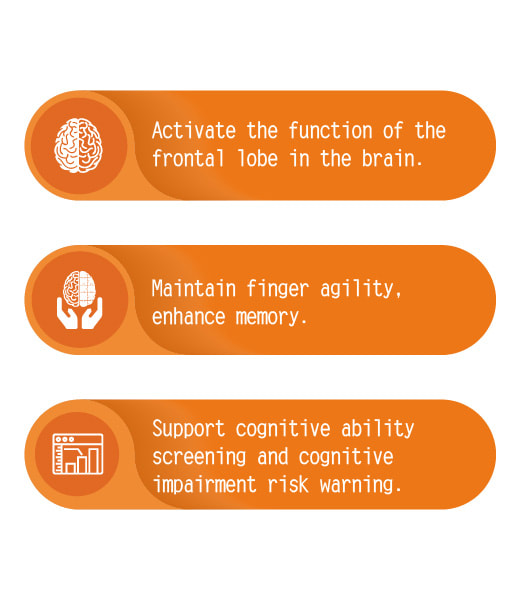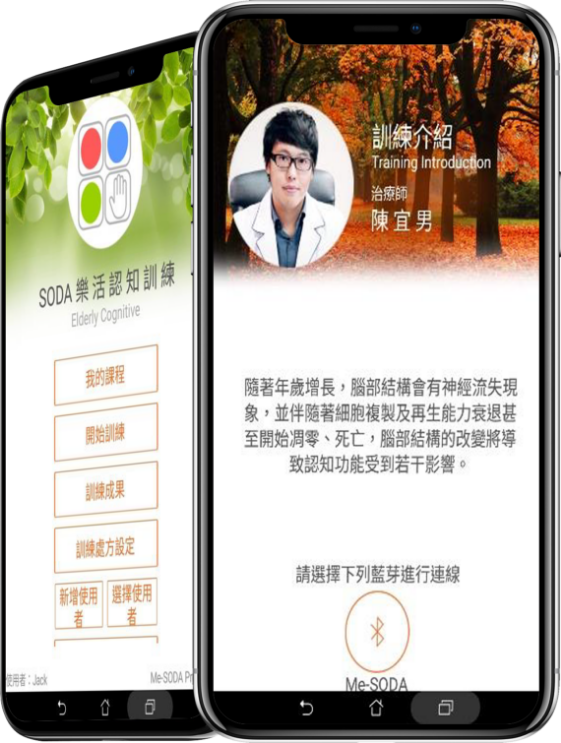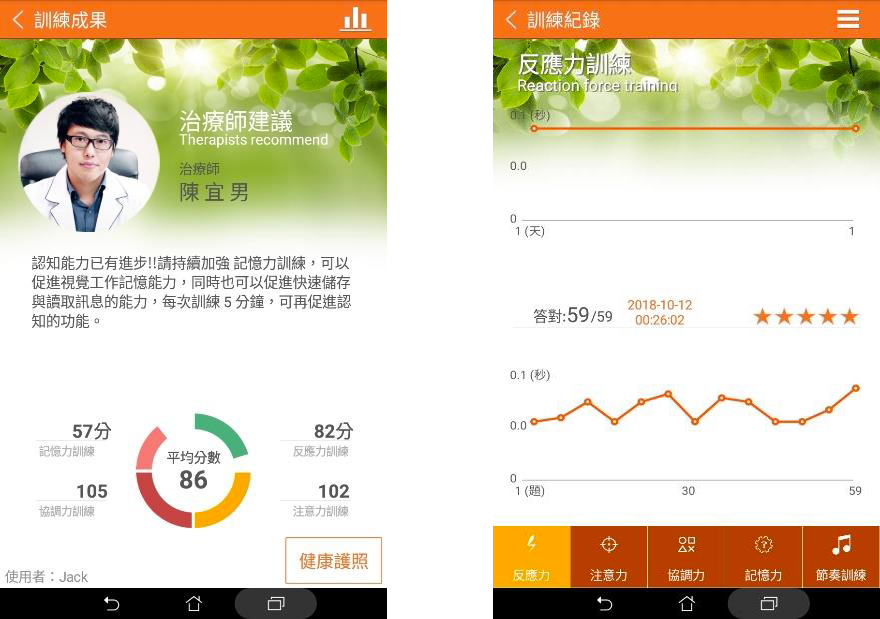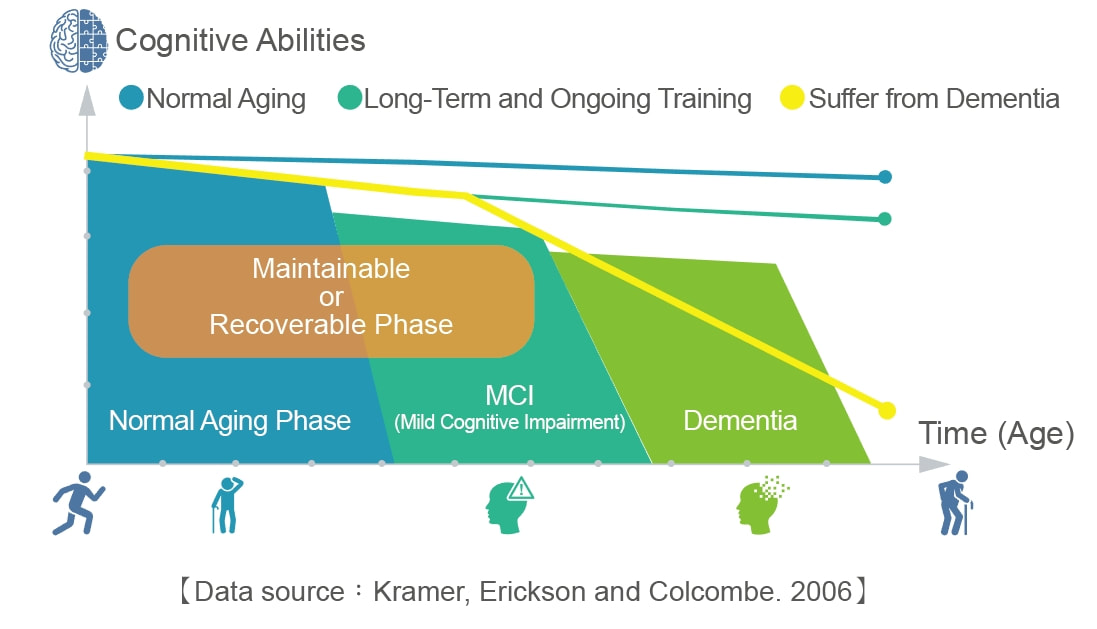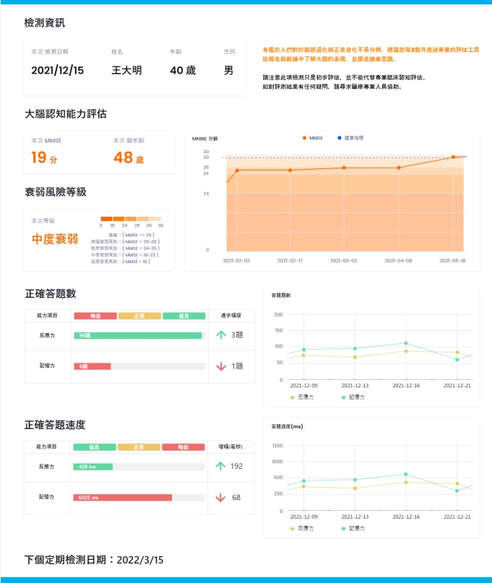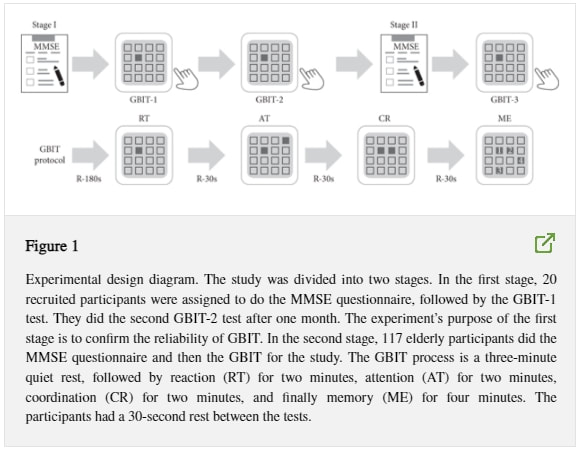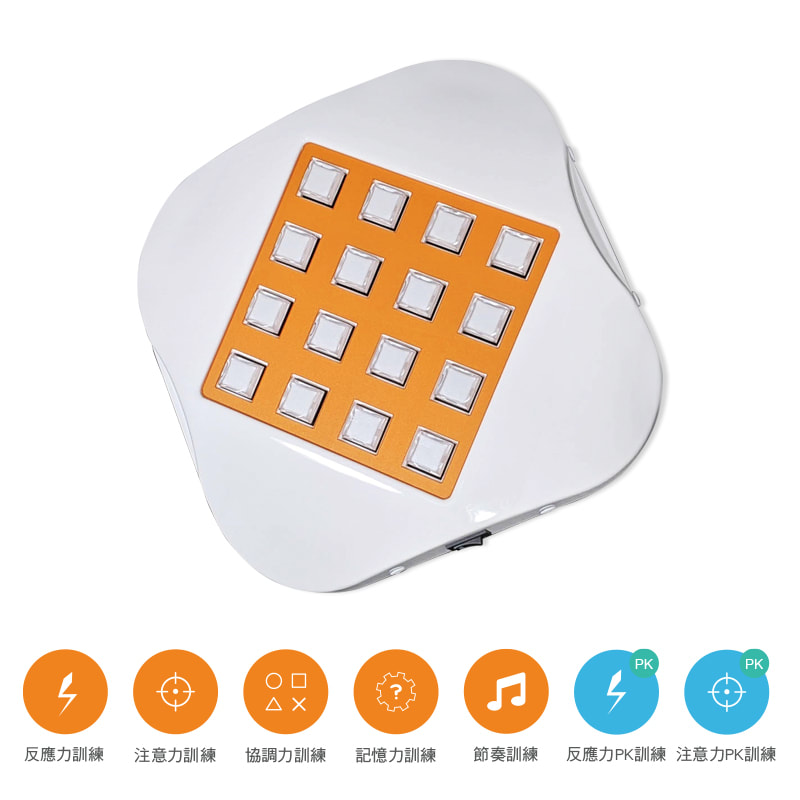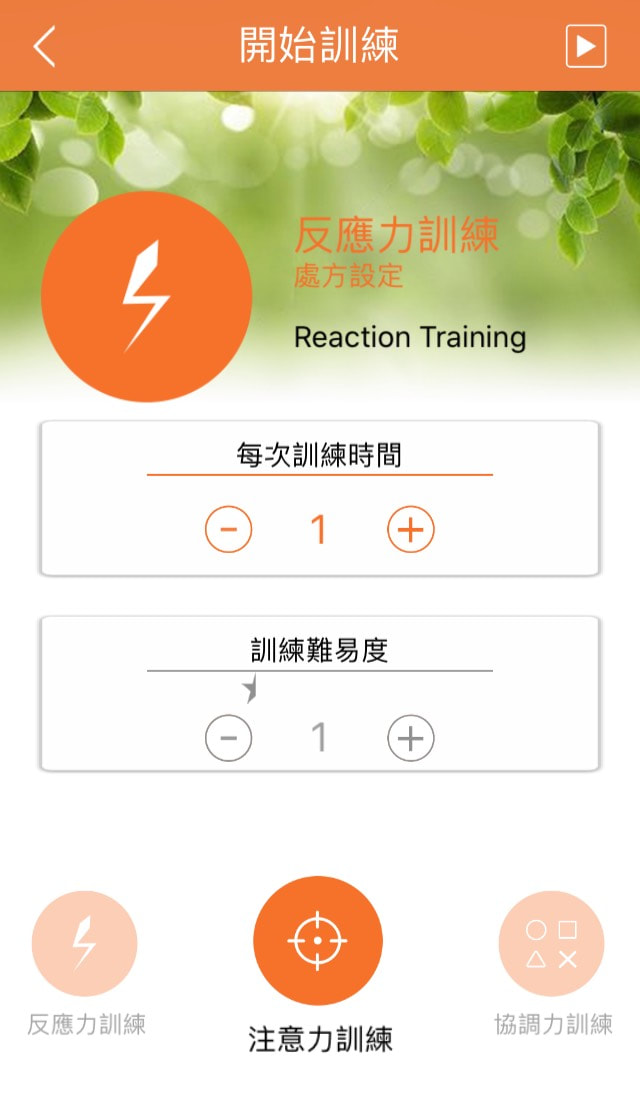The 'Me-SODA Lohas Cognitive Training Machine' is an intelligent cognitive training device designed for home use. It employs AIoT technology, acting like an occupational therapist assisting with cognitive function training at home. It monitors cognitive abilities based on training data, adjusts training programs, promotes brain health, and reduces the risk of dementia.
Exercising the brain for 15 minutes a day delays cognitive funtion decline.
Moving your fingers every day stimulates the frontal lobe and hippocampus of the brain, shich gelps enhance memory.
Me-SODA Lohas Cognitive Training Machine was jointly developed with Occupational Therapist Chen Yi-Nan(陳宜男).
With a background in occupational therapy, we have developed an adult gaming device based on brain plasticity and hand-eye coordination. It includes elements such as responsiveness, attention, coordination, and memory, catering to both individual training and interactive dual-player modes, as well as cognitive assessment. Featuring friendly voice guidance, users can engage in enjoyable cognitive exercises for 10-15 minutes daily with ease.
Easy to operate, seniors can quickly pick it up.
Just open the Me-SODA app, follow each step as displayed on the screen, and receive voice guidance for every operation. Use it for 10-15 minutes following the training modes, easily incorporating a daily brain-activating exercise routine.
Hand-eye coordination training, promoting mental agility.
According to research by the renowned Japanese dementia specialist Dr. Yoshiya Hasegawa, there is a close relationship between the fingers and the brain. The more agile your fingers are, the more active your brain becomes. LTPA collaborates with occupational therapists to utilize finger pressing and design various modes based on the principles of brain plasticity, including responsiveness, attention, coordination, memory, and more. During the use of Me-SODA, it increases cerebral blood flow, contributing to enhanced memory and possessing a younger brain.
Brain training is no longer based on intuition.
We all know that preventing dementia involves using your brain and staying physically active. However, it's challenging to gauge the effectiveness of preventing brain degeneration, even if you do activities like mental math, puzzles, or playing mahjong every day. Me-SODA allows you to assess your abilities based on training scores with every use. All training records are uploaded to the cloud, providing long-term data tracking and real-time reports. You can understand your average ranking among users of your age group, ensuring precise monitoring of your brain abilities and receiving alerts in case of anomalies.
Currently, there are no effective methods to cure dementia.
The primary concern is to reduce the risk of dementia.
Every 3 seconds, a new dementia patient is diagnosed worldwide. Currently, there is no effective cure for dementia. Once diagnosed with dementia, the only option is to slow down cognitive decline to prevent further deterioration. The WHO has also released a 'Guideline for Reducing Cognitive Decline and Dementia Risk,' urging global cooperation to prioritize dementia prevention and risk reduction.
To prevent dementia in advance, at least save tens of millions in expenses.
The awareness that people seek medical attention for dementia symptoms only when they are already in the mild or even moderate stages is not uncommon. According to statistics, the course of dementia lasts for approximately 12 years, and the cumulative cost of care over these 12 years requires at least 13 million. Therefore, reducing the risk of developing dementia not only promotes one's own health but also helps families reduce the financial burden of healthcare.
A Japanese study has confirmed that continuous cognitive training during the mild cognitibe impairment(MCI) stage has a 46% chance of restoring health.
Numerous studies indicate that long-term brain and muscle training can enhance cognitive abilities, aiding in improving the cognitive functions of individuals with mild cognitive impairment(MCI) and preventing cognitive decline in those in the early stages of dementia. According to a report by Japan's Yomiuri Shimbun, the city of Obu in Aichi Prefecture has been actively promoting cognitive exercises. The Longevity Medical Research Center of Japan conducted a four-year study, beginning in 2011, with 4,200 citizens aged 65 and older who had not developed dementia. Using international MCI diagnostic criteria, the study found that 18% (740 individuals) already had mild cognitive impairment at the outset. The research also revealed that cognitive abilities in the elderly do not always decline, with 46% of them returning to a normal state as a result of the study conducted by the Longevity Medical Research Center.
If you have the following problems
- Elders in the family are worried about forgetfulness.
- What to help parents slow down brain degeneration but don't know how?
- I Hope to have daily reference data to easily and objectively judge the cognitive ablilities of elders.
|
Me-SODA provides cognitive ability testing to distinguish between normal aging and cognitive dysfunction.
A 6-minute rapid assessment of cognitive function based on responsiveness and memory tests to calculate your risk of cognitive decline, brain age, and more. The system automatically reminds you to do this every 3 months, continuously tracking changes in cognitive abilities to prevent dementia.
|
|
The product has been empirically validated and published in international journals.
When using Me-SODA for training, there is an increase in blood flow and oxygenated hemoglobin in the frontal lobe of the brain, stimulating autonomic nervous system activation, predicting Mini-Mental Status Examination (MMSE) and cognitive function impairment risk with an accuracy of up to 88%. This study was published in the international journal 'Computational and Mathematical Methods in Medicine' under the title: 'A Novel Game-Based Intelligent Test for Detecting Elderly Cognitive Function Impairment.
Volume 2021, Article ID 1698406, 10 pages
https://doi.org/10.1155/2021/1698406 |
User Experiences Shared
Short-term memory is different now.
My mom started using Me-SODA a few months ago and has noticed a difference in her short-term memory. In the past, when we had family gatherings, she would often forget that we had just had a meal. Now, when I remind her, she says, 'Oh yes, we just had dinner with so-and-so across the street,' and she can recall it.
Evan with a busy work schedule, my mom's cognitive training progress report brings peace of mind to both me and my family.
Even though Me-SODA has AI to help schedule my mom's cognitive training, as a busy professional, I still worry about her progress. Thankfully, all products from LTPA provide cloud-based record keeping and real-time reports, allowing my family and me to stay updated on my mom's training status and cognitive abilities at any time.
Get to know Me-SODA Lohas Cognitive Training Machine in 2 minutes.
|
Me-SODA Lohas Cognitive Training Machine
Move your fingers and rejuvenate your brain. Boost your parents' cognitive abilities, enhance life skills, prevent rapid brain deterioration, and enjoy a healthy and dignified senior life. Product Contents
For pricing information, please contact us.
|
Me-SODA Training Mode Introduction
|
Responsiveness Training
For unexpected events, the ability to respond immediately, while also training alertness and visual scanning breadth. Improved responsiveness can reduce the likelihood of accidents in daily life. Training Methods: Randomly illuminates and records the time it takes for the user to touch the light, using time as a reference indicator for responsiveness strength. Memory Training
Training visual working memory and promoting the ability to quickly store and retrieve information. In the context of everyday traffic while driving, it enhances the ability to quickly recognize and remember potential hazards, thus improving safety. Training Methods: After designated positions light up and go off, users rely on their memory of the lit positions and their sequence to press the corresponding keys in order within a limited time frame. This records the accuracy and time of the taps. |
Attention Training
It not only enhances the ability to concentrate on a specific task, but also has an effect on the breadth of attention and the ability for quick recognition. Strengthening attention can improve problem-solving abilities. Training Methods: Pressing based on the specified light color and recording error rates. Rhythm Training
Using synchronized tapping actions that involve hand-eye coordination, incorporating sound effects and rhythmic interactions to enhance the engagement and variety of the training, aiming to achieve relaxation of both the body and mind. Training Methods: Illuminates in random order, recording the time it takes for the user to touch them, using time as a reference indicator for rhythm strength. |
Coordination Training
Tracking dynamic targets with the eyes and synchronous tapping actions with the hands. It is beneficial for tasks in daily life such as picking up objects, movement control, and precise tool operation. Training Methods: Sequentially pressing in response to the changing light positions and recording the delay time. Two-player PK Training Mode
Extending single-player responsiveness and attention training, along with a two-player battle mode, it allows family and friends to join in for added fun, not only offering a new choice for family entertainment but also enhancing the motivation for training through interaction. Training Methods: Press your own colored lights as quickly as possible until all lights are extinguished. The one with their colored lights extinguished first wins. If a winner is not determined within the time limit, the player with fewer remaining lights wins. If both players have the same number of remaining lights, it will be considered a tie. |
